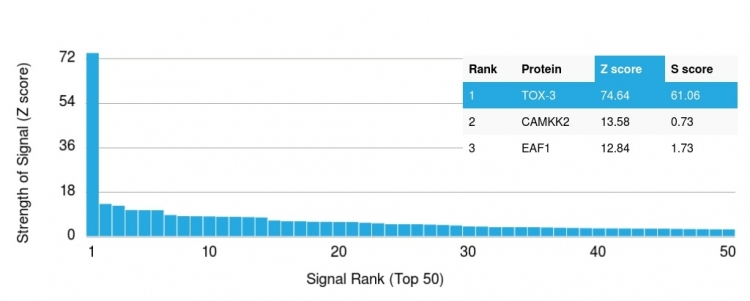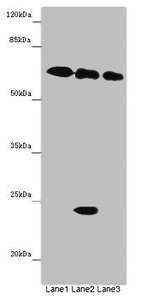![WB analysis of A431 cell lysate using GTX35139 TOX3 antibody [TOX3/1123]. WB analysis of A431 cell lysate using GTX35139 TOX3 antibody [TOX3/1123].](https://www.genetex.com/upload/website/prouct_img/normal/GTX35139/GTX35139_20200115_WB_37_w_23060801_865.webp)
WB analysis of A431 cell lysate using GTX35139 TOX3 antibody [TOX3/1123].
TOX3 antibody [TOX3/1123]
GTX35139
ApplicationsWestern Blot, ELISA, Other Application
Product group Antibodies
ReactivityHuman
TargetTOX3
Overview
- SupplierGeneTex
- Product NameTOX3 antibody [TOX3/1123]
- Delivery Days Customer9
- Application Supplier NoteWB: 1-2microg/ml. *Optimal dilutions/concentrations should be determined by the researcher.Not tested in other applications.
- ApplicationsWestern Blot, ELISA, Other Application
- CertificationResearch Use Only
- ClonalityMonoclonal
- Clone IDTOX3/1123
- Concentration0.2 mg/ml
- ConjugateUnconjugated
- Gene ID27324
- Target nameTOX3
- Target descriptionTOX high mobility group box family member 3
- Target synonymsCAGF9, TNRC9, TOX high mobility group box family member 3, CAG trinucleotide repeat-containing gene F9 protein, trinucleotide repeat-containing gene 9 protein
- HostMouse
- IsotypeIgG2b
- Protein IDO15405
- Protein NameTOX high mobility group box family member 3
- Scientific DescriptionThe protein encoded by this gene contains an HMG-box, indicating that it may be involved in bending and unwinding of DNA and alteration of chromatin structure. The C-terminus of the encoded protein is glutamine-rich due to CAG repeats in the coding sequence. A minor allele of this gene has been implicated in an elevated risk of breast cancer. Two transcript variants encoding different isoforms have been found for this gene.[provided by RefSeq, Apr 2009]
- ReactivityHuman
- Storage Instruction-20°C or -80°C,2°C to 8°C
- UNSPSC41116161






![WB analysis of (A) recombinant TOX3 protein (B) A549 (C) A431 lysates using GTX35140 TOX3 antibody [TOX3/1124].](https://www.genetex.com/upload/website/prouct_img/normal/GTX35140/GTX35140_20200115_WB_23_w_23060801_183.webp)